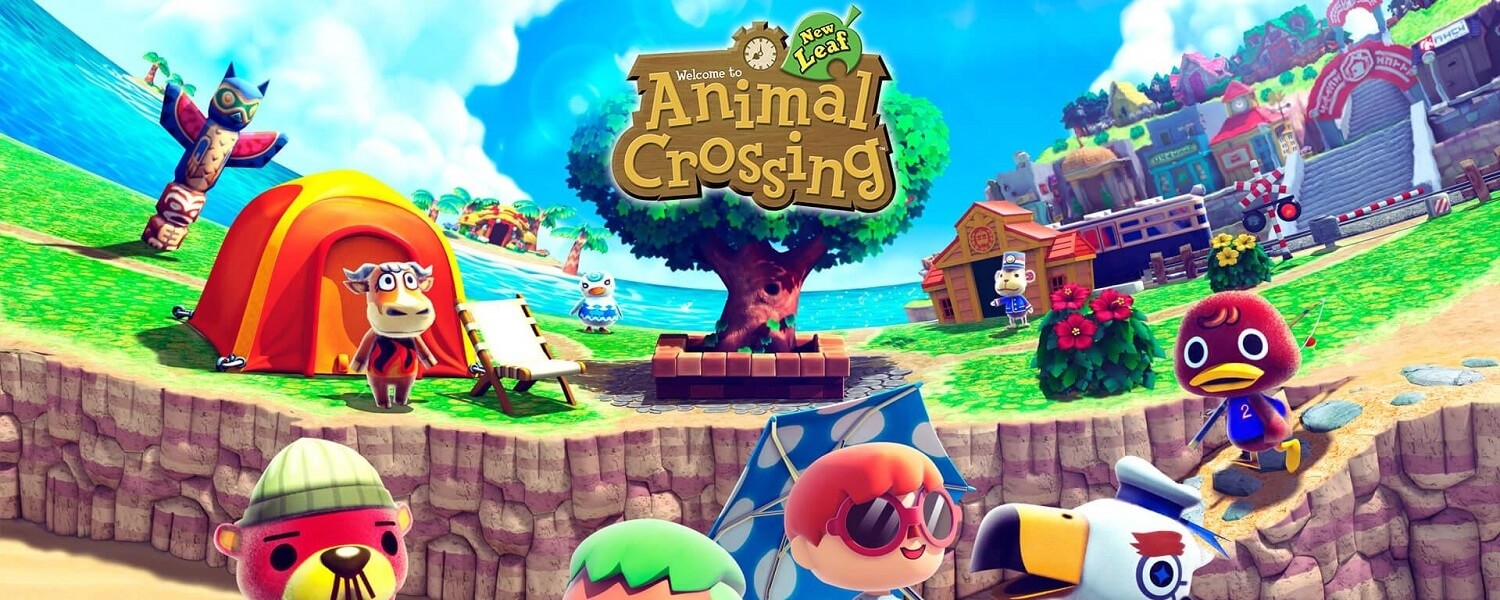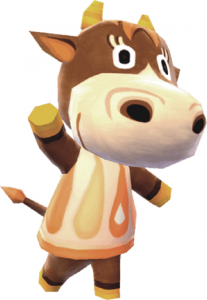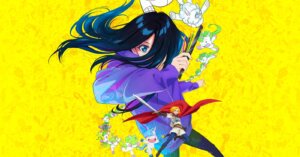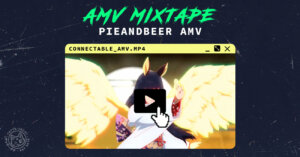If you have every played, or been exposed to, an Animal Crossing game, then you know much of the world’s lingo resides in puns. Everything from character names to fish and bug acquisitions have a pun attached. Puns are a common way to infuse comedy into a situation, though they have varying degrees of success…
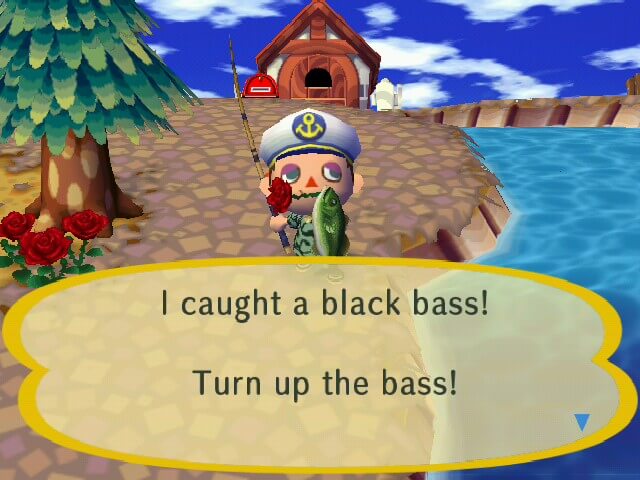
The opinion of puns runs the gamut from genius to worst form of comedy. Whatever your opinion of them, there is no denying they are a very language-specific art form. Many jokes require a shared experience to be truly understood, but puns are even more particular. Without an in-depth knowledge of a language, many puns are lost to outsiders.
The very nature of puns leaves a very large problem for people looking to localize foreign works. Do you maintain the original language at the risk of jokes attached being overlooked by the new audience, or do you change things to maintain the comedy while losing the old jokes?
As I was recently replaying the original Animal Crossing, it occurred to me just how many names in the game were puns. I began to wonder what the original Japanese names were and how they related to the English names given in the game. How much was changed and how much was maintained?
I did some digging and came up with a list of characters, comparing the Japanese names to the English names. Some jokes and puns are quite obvious, others are…a little more obscure. But each is well-crafted in its own right. Let’s take a look at ten Animal Crossing characters and see if we can decipher the hidden meanings to their names.
1. Apollo
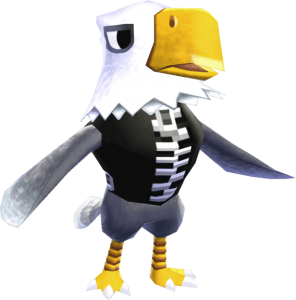
Japanese Release Name: アポロ (Aporo)
English Release Name: Apollo
This is an interesting example in which the name is essentially maintained through translation. The original name Aporo is simply changed to the English spelling Apollo. This name is also interesting because this pun is one of the more complicated ones. As you may be able to tell, Apollo is a Bald Eagle, the national animal of the United States. The name of the space program run by the United States in the 60’s-70’s was the Apollo Program. So the relation is: Bald Eagle -> United States -> Apollo Program -> Apollo. I told you this one was complicated.
2. Bessie
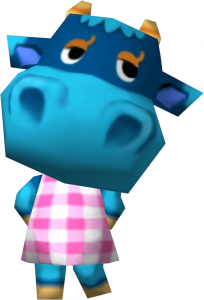
Japanese Release Name: アモレ (Amore)
English Release Name: Bessie
The English reference is clear to anyone famliar with farm culture in the United States. For those who may not know, Bessie is a common name for a cow. It’s similar to how a generic dog in a show may be named “Spot” or a mouse named “Mr. Whiskers.” Bessie’s Japanese name is a bit more complex. Her name, Amore, is from the Italian word for love, amore. The name is actually in relation to her disposition, as she is a friendly and caring character.
3. Dozer
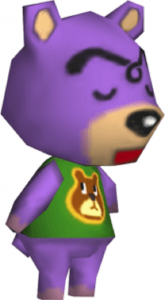
Japanese Release Name: スリッポ (Sleep)
English Release Name: Dozer
This is another case where the name is nearly maintained between the Animal Crossing releases: it was simply changed so that it wasn’t just an English word. This is also another case where the name is related to the personality of the character. As you can tell by Dozer’s half-asleep facial expression, he likes sleep. Napping, resting, slumbering, you name it, he wants in on it. And since he can’t sleep all day, he’ll spend his waking hours talking to you about his greatest passion.
4. Hambo
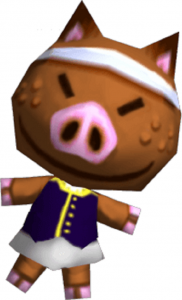
Japanese Release Name: 鉢巻 (hachimaki, Headband)
English Release Name: Hambo
Hambo is an interesting one. The Japanese name is clear enough: he wears a headband, his name means headband, pretty cut and dry. The English name though, is a bit more involved. The first part, Ham, makes enough sense, he is a pig after all. But “bo?” Where does that come from? I have a theory. There is an American film character known as Rambo who is known for his headband…and a penchant for violence, but I’m guessing the headband reference is the one they are going for. Maybe they are cousins?

5. Maple
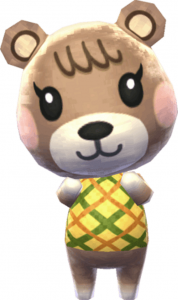
Japanese Release Name: メップル (Meppuru)
English Release Name: Maple
Maple’s name is much like Apollo’s above, it is simply the English reading of the Japanese name. The meaning behind her name is pretty straight forward. Maple is both a reference to her fur color, brown, which is also the color of maple syrup, and the sweetness of her personality.
6. Nibbles
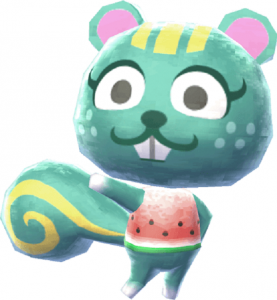
Japanese Release Name: ガリガリ (Garigari)
English Release Name: Nibbles
Nibbles has an interesting name. Her name is a reference to the fact that squirrels are known chewers, spending lots of time chewing on nuts. Her original name, Garigari, is the Japanese onomatopoeia for the sound of chewing. The meanings of the two names are quite related. This is a case where the pun/reference was adapted to the new language.
7. Patty
Japanese Release Name: カルピ (Karupi)
English Release Name: Patty
Patty’s English name could be a double reference to beef patties, the main component of a hamburger and a cow patty, the, umm, remains of a cow’s digestion… Karupi is likely a reference to Karupisu, a Japanse milk-based soft drink. This name set is an example where the name is quite changed and the reference is changed to match. But even so, the comedy is maintained, although the localized one is a little darker.
8. Purrl
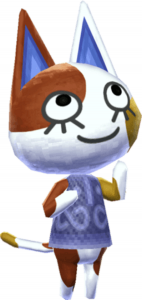
Japanese Release Name: たま (Tama)
English Release Name: Purrl
Both of Purrl’s names are references to cats, but in different ways. Purrl is a clear nod to purring, that rumbling noise that content cats make. Tama requires a bit more explanation. Like Bessie being a common name for cows in the United States, Tama is a common name for cats in Japan.
9. T-Bone
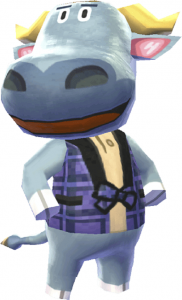
Japanese Release Name: ボルシチ (Borushichi)
English Release Name: T-Bone
For those unfamiliar with steak cuts, a t-bone is considered a very fine cut of beef. Being T-Bone is a cow, this one is pretty easy. His Japanese name, Borushichi, is the Japanese pronunciation of the Ukrainian dish “borscht,” a soup that is usually made with a beef or beef stock base.
10. Tom
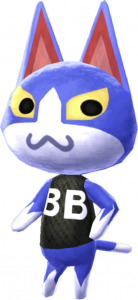
Japanese Release Name: バンタム (Bantamu)
English Release Name: Tom
The name Tom is a play on the term “tomcat” a common phrase used to refer to a male cat. The name Bantamu refers to “bantamweight” a division in boxing in Japan. Given his athletic personality, that name fits him quite well. This is one of the examples in which the name is changed drastically, but for a clear reason. The phrase “bantamweight” has little meaning to a western audience so the change is understandable.
I hope you have enjoyed this foray into the world of Animal Crossing names! I’ve gone through just a small sample of what the game series has to offer, there are hundreds of villagers and this article has only covered a few. If you have any characters whose names you know about (or want to know about) leave a comment below!
Source: Nookipedia

Featured Sponsor - JAST
The sweetest romance and the darkest corruption, the biggest titles and the indie darlings; for visual novels and eroge, there's nowhere better.
Big thank you to our supporters
From their continous support, we are able to pay our team for their time and hard work on the site.
We have a Thank-You page dedicated to those who help us continue the work that we’ve been doing.
See our thank you page